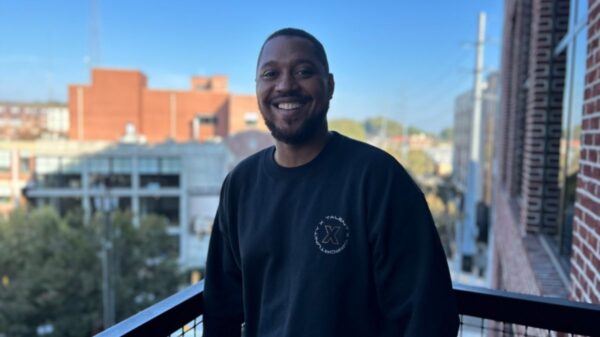By Noah Washington
The Atlanta Voice
Reprinted – by Texas Metro News
https://theatlantavoice.com/
THE ATLANTA VOICE — In recent years, internet connectivity has become necessary and essential to education, professional advancement, and daily life. However, certain communities, particularly those near Historically Black Colleges and Universities (HBCUs), are often excluded from reliable, high-speed internet access. Sparks, Culture Wireless’s CMO, has been actively working to address this issue. Based in Atlanta, Culture Wireless was founded during the COVID-19 pandemic to close the digital divide in underserved communities, particularly around Atlanta University Center and its surrounding areas.

Sparks (above) attended Albany State University to study chemical engineering before transferring to Georgia Tech to complete his degree. Photo by Noah Washington/The Atlanta Voice.
By Noah Washington | The Atlanta Voice
“Why can’t we impact the infrastructure? Why can’t we own everything? Because at the end of the day, the moment we say something about it, that’s when it takes off,” said William “Bam” Sparks, 40, co-founder and Chief Marketing Officer of Culture Wireless, reflecting on Black culture’s innovation and potential.
In recent years, internet connectivity has become necessary and essential to education, professional advancement, and daily life. However, certain communities, particularly those near Historically Black Colleges and Universities (HBCUs), are often excluded from reliable, high-speed internet access. Sparks, Culture Wireless’s CMO, has been actively working to address this issue. Based in Atlanta, Culture Wireless was founded during the COVID-19 pandemic to close the digital divide in underserved communities, particularly around Atlanta University Center and its surrounding areas.
Sparks attended Albany State University to study chemical engineering before transferring to Georgia Tech to complete his degree. Upon graduation, a different path unfolded. During his time at Georgia Tech, he was introduced to the entertainment world by his cousin, Douglas Peterson, a friend of Atlanta rapper T.I.
When T.I. sought to establish a sports agency called Grand Hustle Sports, Sparks became one of the first people contacted. He pivoted to sports management, putting his chemical engineering background on hold to pursue this new career. His networking skills and business acumen quickly earned him a reputation, leading to success in the entertainment and sports management sectors.

Sparks (above) attended Albany State University to study chemical engineering before transferring to Georgia Tech to complete his degree. Photo by Noah Washington/The Atlanta Voice.
Sparks, a “Grady baby” from Collier Heights, first encountered the internet access issue at the AUC in 2020. There, he noticed a significant gap in connectivity between different Atlanta communities. “We went to the AUC to discuss E-Sports,” Sparks recalls. To his surprise, he found that while the area had high bandwidth capabilities, affordable internet options were lacking due to high costs from providers like AT&T and other ISPs. This inspired Sparks to create Culture Wireless, recognizing that existing networks often overlooked underserved communities. He observed that fiber internet costs were unaffordable for many residents. Thus, the idea for Culture Wireless emerged, aimed at providing affordable internet access for all.
In collaboration with various providers and local organizations, Sparks implemented a small data center and established a “mesh network” that connected nodes to provide internet access to the AUC area. This network proved essential after COVID-19, particularly as students struggled to complete assignments due to limited connectivity. The initial project served as a pilot for Culture Wireless’s broader mission to bridge the digital divide.
As a Black-owned Internet Service Provider (ISP), Culture Wireless faces the challenge of bringing affordable connectivity to underserved areas. Sparks highlights the Biden Administration’s Affordable Connectivity Program (ACP), which initially subsidized internet costs but was exhausted by early 2024. According to Sparks, his vision extends beyond Atlanta. “80% of HBCUs are in internet deserts,” he explained, referring to the limited infrastructure at many of these institutions. Culture Wireless aims to provide broadband access to HBCUs across the country, creating a foundation of connectivity that fosters educational and economic opportunities.
Despite their progress, Culture Wireless has faced obstacles. As venture capital (VC) funding for Black businesses reportedly declined by 60% in 2024, Culture Wireless felt the impact. “It’s a struggle. I feel like our issue has been finding people who invest in what we do,” Sparks said, referring to investors’ focus on trendy industries over internet equity. Nevertheless, Sparks believes that his team at Culture Wireless has the expertise and dedication to effect real change.
Together with his team—CEO Al Adjahoe, COO and co-founder Jerome Howard, Chief Brand Officer Marcus Stevens, and Chief Strategy Officer Pete Johnson—Sparks is confident in Culture Wireless’s potential to scale. Currently serving the AUC area and surrounding neighborhoods, including Vine City, The Bluff, and Clayton County, Sparks reflected, “After COVID, I saw that our kids didn’t have internet access. And I’m like, wow, this is crazy. Kids are literally going to the library to do their homework, but the fiber is right here. So why can’t I help provide it?”
Sparks is steadfast in his belief that internet access is a fundamental right. As he and his team press on, their mission centers on ensuring underserved populations are connected. “We, Black people—we are the culture, but we don’t own any of the infrastructure,” Sparks stated. Culture Wireless’s long-term goal is to equip the culture with the tools to keep innovating and pushing forward. “Why don’t we continue to change the narrative?”
To learn more about Culture Wireless, visit their website HERE.





You must be logged in to post a comment Login